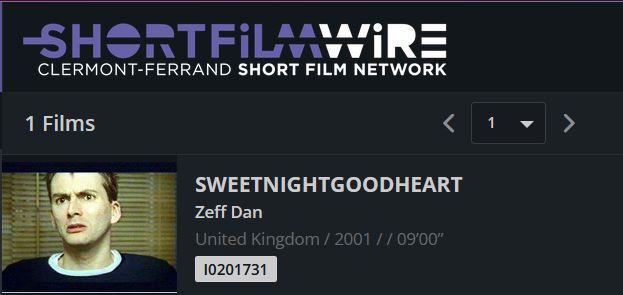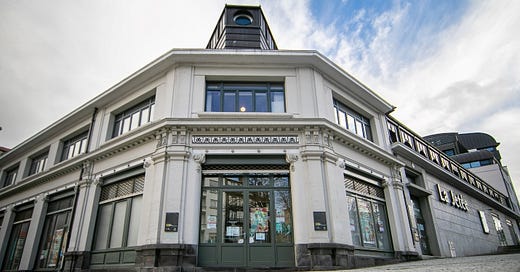David Tennant: In The Archives
...we delve into some lesser-known repositories to find some DT treasures!
If you’re like me - and if you’re here and interested in reading my arguably nitpicky, detail-oriented research into David’s work, I suppose you are - you get excited when you find out you can make personal visits to repositories and archives if you want to delve deeper into David’s career. If that’s your jam, today’s post might give you a boost of adrenaline!
I’ve already written a guide on the major repositories and archives where some of David’s works are housed, and I’m sure some of you long-time ATTA readers are already familiar with it. If not, you can find it at the center of my home page, or simply click below to view it.
It’s a pretty exhaustive guide which covers how to find where a variety of David’s work is stored. A few of these resources were written by me, and some were contributed by other DT fans. Those I’ve written tend to focus on David’s theatre and audio works and are largely resources you have to go see on site, in person. The contributed lists tend to focus on where to find his body of television and film work online.
RESOURCES: Finding and Watching David Tennant's Work
Most David Tennant fans eventually find themselves wondering, “Where can I see David’s work?” Following are some links to resources where you can find out a bit more about how to access David’s work, as well as some interviews he’s conducted over the years and where some of his early theatre work is archived.
—
But let’s get back to the point of this post, shall we?
As I said, my main article touched upon all the main archives where David’s work can be found - Shakespeare’s Birthplace Trust, the Globe Theatre, the British Library. No surprises there, right?
But what if I told you there are a few hidden archives…smaller places you could go in person to view some of David’s work? Would that interest you?
Notice I said in person, and not virtually. Yup.
Yes, I know it’s rather frustrating if you’re not in a position to actually visit these places. Believe me, I feel you. I was lucky enough to get most of my visits in from 2016-2019, as I visited the UK regularly before the Plague Times and lived in Glasgow for the two years right before Covid reared its despicable head. But now I’m back in the US, and as I’m still Covid conscious (haven’t caught it yet and intend to keep it that way!), I don’t anticipate being able to visit the UK again for the foreseeable future.
Meanwhile I’ve kept researching, and of course in the years since 2020 I’ve discovered a few more of David’s works in archives and libraries which I didn’t know existed when I was able to go. I’m certain these aren’t the only places he’s got material related to his career stored - goodness, no - but for today’s post, here are three places I’m curious about and haven’t explored!
The first place which is obscure but super cool is the Centre de Documentation du Cinéma et du Court Métrage de La Jetée (La Jetée Cinema and Short Film Documentation Center). Located in the center of Clermont-Ferrand, France, on the ground floor of La Jetée, the Documentation Center is part of the Clermont Auvergne Métropole library network. The city also holds an annual short film festival (the Clermont-Ferrand International Short Film Festival), which is coming up in late Jan-early Feb of next year.
From their website:
The Documentation Center gathers more than 40 years of archives of the world's largest short film festival. Any paper or audiovisual document on the production of short films is systematically archived and made available to the public.
The Documentation Centre at La Jetée is open to the general public from in and around Clermont-Ferrand, to students, researchers and programmers. There they can consult and view the Festival archives, features films, publications, magazines, all dedicated to the trades and history of cinema. Admission is free, no prior registration needed.
As you’ve probably gathered, this particular archive stores short films. They say they have over 100K digitized short films researchers can view for free through their video library (with a reservation for their screening rooms, of course.) Not only that, but they have a vast archive of documentation on the creation and programming histories of many of these short films!


When I conducted a search, I could find five of David’s short films archived there - Sweetnightgoodheart (2001), Old Street (2004), Nine 1/2 Minutes (2003), Traffic Warden (2004), and…One-Eyed-Jacques (2001)!
And while four out the five short films have likely been seen by most of David’s fans, that last one - One-Eyed Jacques? Probably not! I did a deep dive on this interesting little film, and if you haven’t read it, you should. You’ll learn why you can’t see David’s face in it:
So - while it might not seem like it’s worth your while to go to the Documentation Center (since four out of these five films can already be seen in other ways) it might actually be more fun than you think. I imagine the quality of the film is much better there than it is after it’s been bootlegged a gazillion times. Besides, if I was in the area, I’d definitely go and see all of them, for no other reason than to enquire whether they also hold any documentation available for how these films were made! That, my friends, is the kind of information I’d love to get hold of myself.
The second obscure but equally cool repository is called The Archive of Performances of Greek and Roman Drama (the APGRD). It is a research project based in the Classics Faculty - the Ioannou Centre for Classical and Byzantine Studies - at the University of Oxford.
You’re probably thinking to yourself…Greek and Roman drama? WTF? What has David done that’s Greco-Roman in origin? And if Antigone from the 7:84 popped into your head, I’ll give you a point for obscure DT knowledge whilst simultaneously shaking my head no.
I mean, yes…Antigone IS a part of this, yes, but not his 1993 production for the 7:84. No, he was involved in another Antigone in July 2003 as part of the BBC Proms!
For this 2003 production of Antigone, David played the role of Haemon. There is information about this production at the APGRD right here in their collections:
I’d love to go the APGRD and dig deep into all the information they have on this production, as I know precious little about it. I’ll likely do another post on what I do know about it at some point, but for now, I’ll have to wish I could visit Oxford.
They also hold records on an ancient play by Euripedes called Medea. Playwright Liz Lochhead, the former Makar (National Poet) of Scotland, did an adaptation of the play which won the Saltire Society Scottish Book of the Year Award in 2001. Anyway, Lochhead’s adaptation was used as the text for a staged reading at the Cottesloe Theatre on 2 February 2001, possibly (??) directed by Graham McLaren from the Theatre Babel company.
If my information is correct, David participated in that staged reading in the role of the Bodyguard, which was a part of a series at The National that included readings of Ajax and The Dianiera. It’s very possible my information isn’t correct, though, because though the APGRD has records of these readings, unlike Antigone, they don’t have any links back to David’s name.
But if I’ve learned anything, I’ve learned to always, always check source records. This is another reason I would love to go to the APGRD’s repository and spend the day diving into all the records which pertain to Medea. I’d enjoy finding out if I could connect David to these performances, or if I need to conduct a different search elsewhere.
Sadly, according to their website’s “Visit Us” page, the APGRD’s archive collections are currently closed to visitors until sometime next month - and perhaps into February 2025. Not that I can go anyway, but if someone were to go…
*sigh*
Moving on!
Lastly - if you happen to be near the Central Library of the Sicilian Region in Palermo, Italy, there’s a listing there for a 25-page book I am absolutely dying to get a look at:
Its contents have gnawed away at my curiosity cat for years, and I’d love to rule it in or out with regards to whether it’s got anything to do with David’s early theatre work. That all the explanation is in Italian makes it more difficult for me to determine whether it’s relevant. It does appear the book isn’t available on the shelf (re: the word “consultazione”) and a patron in the library would have to reserve time to look at the volume, probably in a Special Collection area. I’ve done this plenty of times, so that’s familiar to me.
In order to explain to y’all why I’m interested in this particular volume, I need to do a bit of early David theatre explanation regarding the phrase, “Teatro e scuole di teatro, per un festival internazionale : Palermo 20, 21, 22, settembre 1990,” in this listing.
That’s because on those dates in September 1990, David Tennant and four of his fellow students from the Royal Scottish Academy of Music and Drama (RSAMD) travelled to Palermo during their course vacation to participate in a European Festival of Drama Schools - which of course concentrated on theatre acting and training. They presented a Shakespeare compilation entitled, “My So Potent Art Shakespeare,” which was written and directed by the RSAMD’s Director of Drama, Edward Argent. Argent also delivered a paper to the conference linked to the Festival.
“My So Potent Art” was a compilation of A Midsummer Night's Dream and The Tempest. For the production, David played Oberon, King of the Fairies (A Midsummer Night's Dream) and Prospero (The Tempest). And, as the quote "My so potent art" comes from Prospero's speech in Act V, Scene I of The Tempest, it was David who got to speak the programme’s title during the performance!
That International European Festival of Drama Schools? It was called the “Teatro E Scuole Di Teatro Festival”.
…and now you know why I’m so interested in this little book!
I wish I could flap my arms all the way to Palermo and mysteriously become fluent in Italian so I could read what it says about the 1990 festival. I’ve told you pretty much all I know about David’s role in the programme, so I would dearly love to know if “My So Potent Art” in general (and David in particular) got any mention in the book at all. At only 25 pages in length my hopes are slim, but it would be fascinating to know anything at all about the festival.
So I’m just throwing it out there: if it so happens that any of my readers are close to Palermo and wish to take up the gauntlet of reading and taking detailed notes about this little volume (*bats eyes*), email me. You might hear a grown woman cry in gratitude.
And if you happen to go to Clermont-Ferrand or Oxford and delve into those records? If you let me know what you find, I might shed more than a few tears for that kind of information, too!









Thank you for this information, will now definitely try to go to Oxford next year.
I feel so back at my studies - and if I would have know before, as I was in Palermo recently. Have you checked for the book if it has been digitized perhaps by Google?